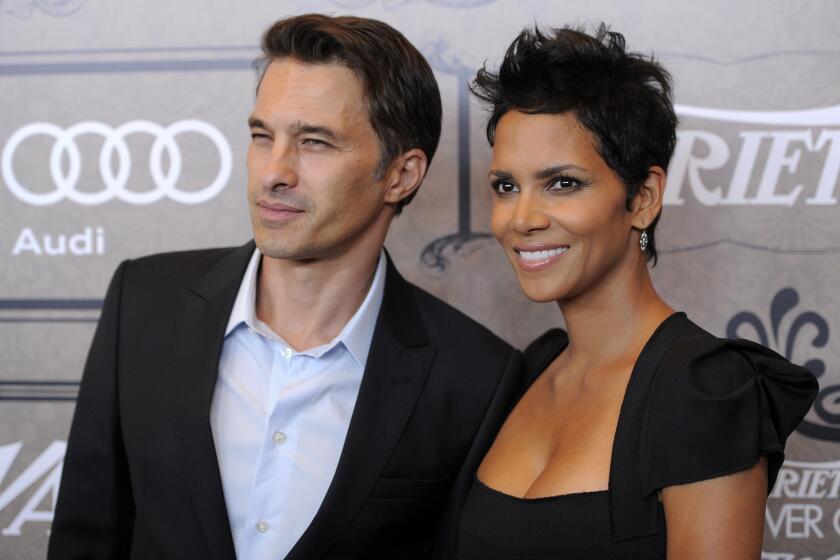With the success of ‘Hacksaw Ridge,’ is it time for Hollywood to ‘get over’ Mel Gibson’s past?
Mel Gibson believes the perception in Hollywood is that he has spent the last decade “somewhere in an attic, trying to chew through my restraints.”
If that’s the case, then Gibson’s recent return to the public eye with “Hacksaw Ridge,” the well-received war drama he directed, must come as something of a shock.
Gibson has been busy promoting “Hacksaw,” which has grossed nearly $15 million since opening this week, sitting for select interviews and showing the movie to his Hollywood peers. The response has been overwhelmingly positive, particularly given that Gibson has been largely ostracized from the filmmaking community since he uttered anti-Semitic slurs during a 2006 Malibu drunk driving arrest.
Gibson has shown “Hacksaw Ridge” to academy members and movie guild audiences on several occasions recently in Los Angeles and New York. And when he came on stage following the screenings, most in the audience stood and applauded.
“There’s always some trepidation,” Gibson told The Times in a recent interview. “It’s a fickle game, Hollywood.”
If Hollywood forgives that man this soon, that’s messed up.
— One academy member
Does all the validation, which included another well-attended screening for academy members Saturday night (and another standing ovation following the film), indicate that Gibson’s time in movie jail has come to an end?
It depends who you ask. The Times spoke to several academy members who said, off the record, that they wanted nothing to do with Gibson, his movie or any project he might make in the future.
“If Hollywood forgives that man this soon, that’s messed up,” one academy member says.
Bill Mechanic, who produced “Hacksaw Ridge” and made the Oscar best picture winner “Braveheart” with Gibson while he was chairman of Fox Filmed Entertainment, knows many such people holding grudges against Gibson. To gauge whether people might be ready to forgive Gibson’s past — which also includes a 2010 audiotape catching him threatening his then-girlfriend with physical abuse and uttering racial epithets — Mechanic invited the naysayers to a “Hacksaw” screening in September.
He’s 10 years sober. Let’s turn the page.
— Bill Mechanic, “Hacksaw Ridge” producer
“There wasn’t anybody who walked out of the movie thinking it wasn’t a great film and he isn’t a great filmmaker,” Mechanic says.
Speaking of Gibson’s checkered past, Mechanic adds: “It’s time to get over it. He didn’t commit a crime. He did something that is not condone-able. He did it 10 years ago. He was drunk. He’s 10 years sober. Let’s turn the page.”
Gibson himself followed that script when talking to The Times about his future in Hollywood. Asked if he agreed with the assertion made by “Lethal Weapon” screenwriter Shane Black that he had been effectively blacklisted in Hollywood for the past decade, Gibson answered: “You mean, Shane Black-listed? Yeah, I guess. He tried to make something with me and encountered a roadblock. It’s been an interesting decade.”
I had a couple of bad moments. I think it’s called a nervous breakdown? So it’s a pity you get penalized for that. But there you go.
— Mel Gibson
Returning to the image of him being held captive in an attic, out of sight, out of mind, Gibson offered: “I’m not completely nuts or anything. I had a couple of bad moments. I think it’s called a nervous breakdown? So it’s a pity you get penalized for that. But there you go. I’m not chewing through my restraints. I’m quite capable. I’m just raring to go. I can do it. And I love doing it.”
Gibson says he’s being offered work, citing an unspecified project from filmmaker Ridley Scott’s production company, Scott Free Productions, that maybe he’ll “march off and do.” He’s shooting “The Professor and the Madman,” a drama about the men who put together the Oxford English Dictionary. Farhad Safina, who wrote the epic adventure “Apocalypto” with Gibson, is directing.
The projects that Gibson has ready to go — a long-gestating Viking “berserker” he co-wrote with “Braveheart” screenwriter Randall Wallace and a biblical epic about the Jewish historical figure Judah Maccabee — but he hasn’t been able to find anyone to bankroll them. And he’s unwilling to finance the projects himself, as he did with “The Passion of the Christ” and “Apocalypto.”
“Something about the Maccabees? People don’t see it,” Gibson says. “And I’m not going to do it myself. But those things will come.”
Perhaps sooner than later, if “Hacksaw Ridge” manages to build on its opening weekend, a reasonable prospect given the movie’s good reviews and A audience grade from market research firm Cinemascore. (Moviegoers older than 50 gave it an A+.)
That success, notes film historian Leonard Maltin, is but the latest case of Hollywood-style redemption.
“It’s a dilemma we can never completely escape, separating the artist from his or her creation,” Maltin says, citing such filmmakers as Woody Allen, Roman Polanski and Nate Parker, who’ve all dealt with their own controversies. “There’s never an easy answer. But if the movie’s good, it seems like people have a much easier time accepting the apology.”
Twitter: @glennwhipp
ALSO:
Andrew Garfield goes to war in Mel Gibson’s pacifist bloodbath ‘Hacksaw Ridge’
Mel Gibson goes from most hated man in Hollywood to receiving a standing ovation
More to Read
Only good movies
Get the Indie Focus newsletter, Mark Olsen's weekly guide to the world of cinema.
You may occasionally receive promotional content from the Los Angeles Times.











